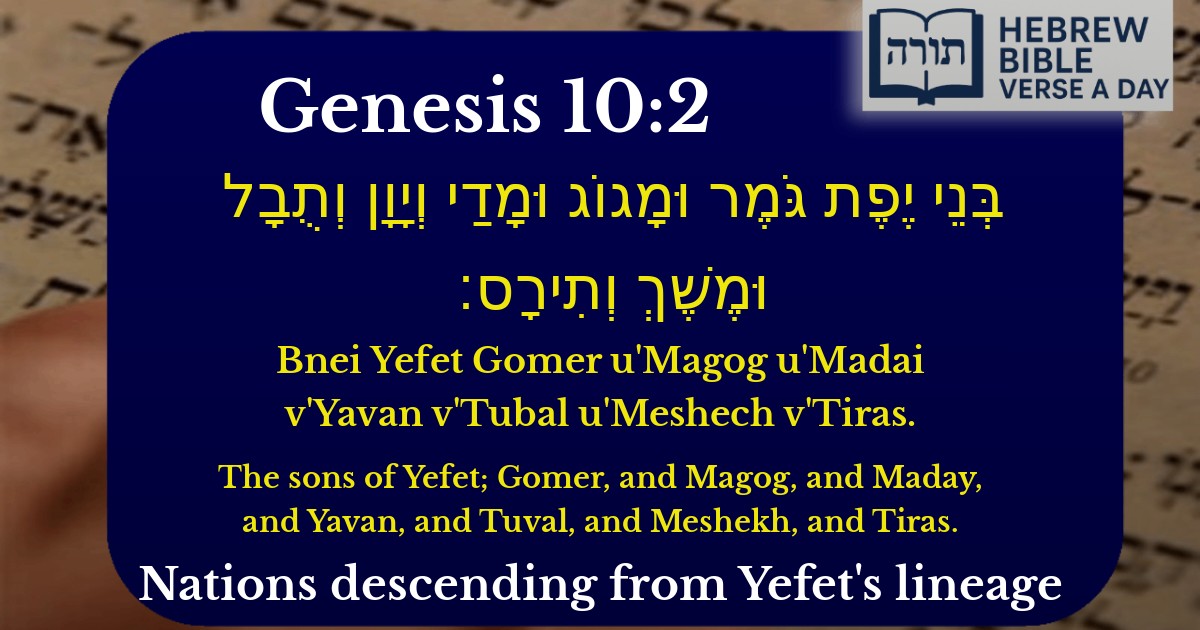Frequently Asked Questions
Q: Who are the sons of Yefet mentioned in Genesis 10:2?
A: The sons of Yefet—Gomer, Magog, Maday, Yavan, Tuval, Meshekh, and Tiras—were the ancestors of various ancient nations. According to Rashi and other commentaries, these nations settled in different regions, with Yavan (Greece) and Maday (Media) being particularly significant in later Jewish history.
Q: Why is the list of Yefet's descendants important in the Torah?
A: The Torah lists the descendants of Noah's sons—Shem, Cham, and Yefet—to trace the origins of nations. Yefet's descendants represent the peoples who settled in Europe and parts of Asia. The Talmud (Yoma 10a) explains that these nations played roles in world history, and some, like Yavan (Greece), later interacted with the Jewish people.
Q: What is the significance of Yavan (Javan) being a son of Yefet?
A: Yavan (Greece) is significant because Greek culture later influenced Jewish history, especially during the time of the Chanukah story. The Midrash (Bereishit Rabbah 37:1) notes that Yefet's name means 'beauty,' and Greek culture emphasized aesthetics, which is why Yavan is listed among his descendants.
Q: How does Genesis 10:2 connect to Jewish history?
A: This verse lays the foundation for understanding the origins of nations that interacted with the Jewish people. For example, Magog is associated with future events in Jewish eschatology (Ezekiel 38-39), and Yavan (Greece) was the oppressor in the Chanukah story. Rambam (Hilchos Chanukah 3:1) discusses the Greek influence on Jewish life.
Q: Are the descendants of Yefet still relevant today?
A: Yes, many modern nations trace their origins to Yefet's descendants. For example, Yavan (Greece) and Maday (Medes/Persians) played key roles in Jewish history. The Talmud (Megillah 11a) discusses how these nations influenced the Jewish people, and their legacy remains part of our historical and prophetic understanding.


The Sons of Yefet in the Torah
The verse lists the seven sons of Yefet, one of the three sons of Noach (Bereishit 10:2). According to Rashi, these names represent nations that descended from Yefet, who was blessed by Noach with expansion and beauty (Bereishit 9:27). The Ramban explains that Yefet's descendants settled primarily in the northern and western regions of the known world.
Identification of the Nations
Traditional Jewish sources identify these nations as follows:
Historical and Eschatological Significance
The Talmud (Yoma 10a) discusses how these nations played roles in Jewish history, particularly Yavan (Greece) during the Chanukah story. Magog is also significant in eschatological teachings, as Yechezkel (38-39) prophesies a future war involving Gog and Magog.
Spiritual Legacy of Yefet
Noach's blessing to Yefet, "יַפְתְּ אֱלֹהִים לְיֶפֶת" ("May God enlarge Yefet"), is interpreted by the Gemara (Megillah 9b) as referring to the beauty of Greek language and wisdom, which was permitted to be studied (aside from idolatrous elements). However, the Sages emphasize that the spiritual legacy of Shem (Torah) must remain primary (Bereishit Rabbah 36:8).